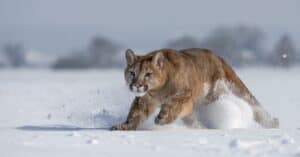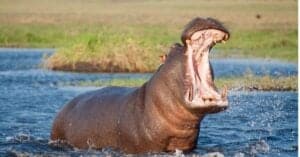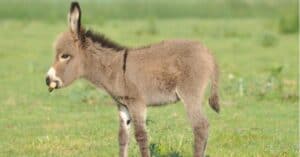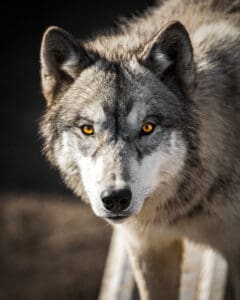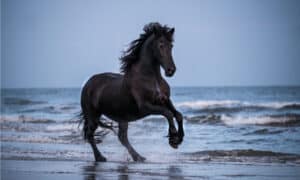A Question of Elimination: Do Whales Poop?
@media (min-width: 481px) {
.mobile-top-content {
display: none;
}
}
#mobileTopContentCTACarouselControls { overflow: hidden; text-overflow: ellipsis; white-space: nowrap; }
.mobile-top-content .more { color: #fff; }
.mobile-top-content a { color: #fff; text-decoration: underline; }
.mobile-top-content a:hover { color: #fff; text-decoration: underline; }
@media (max-width: 480px) {
.mobile-top-content {
background-color: #06a10b;
color: #fff;
text-align: center;
/*height: 60px;
padding-top:5px;*/
font-size:80%;
/* display: block; */
margin: 0px -30px;
}
}
Majestic is a word that comes to mind when we think of whales because of their immense size and grace in the water. They’re one of the last large mammals that roam the earth. Megafauna, like mammoths, were alive at the same time as whales.
Whales are in the order Cetacea, along with porpoises and dolphins. They are referred to as cetaceans. They’re important ocean dwellers for a variety of reasons, but their numbers have been decimated over the last couple of centuries.
Hunters killed 99% of the blue whales in the Southern Hemisphere, and other types of whales have similarly gruesome statistics. Since then, conservation efforts around the globe have helped to increase whale numbers dramatically.
The ocean is said to be the earth’s biggest toilet, which is a good thing for the life cycles of many animals. So, do these majestic whales poop in the ocean? We’re going to look at some details about whale excrement.
Do Whales Poop?
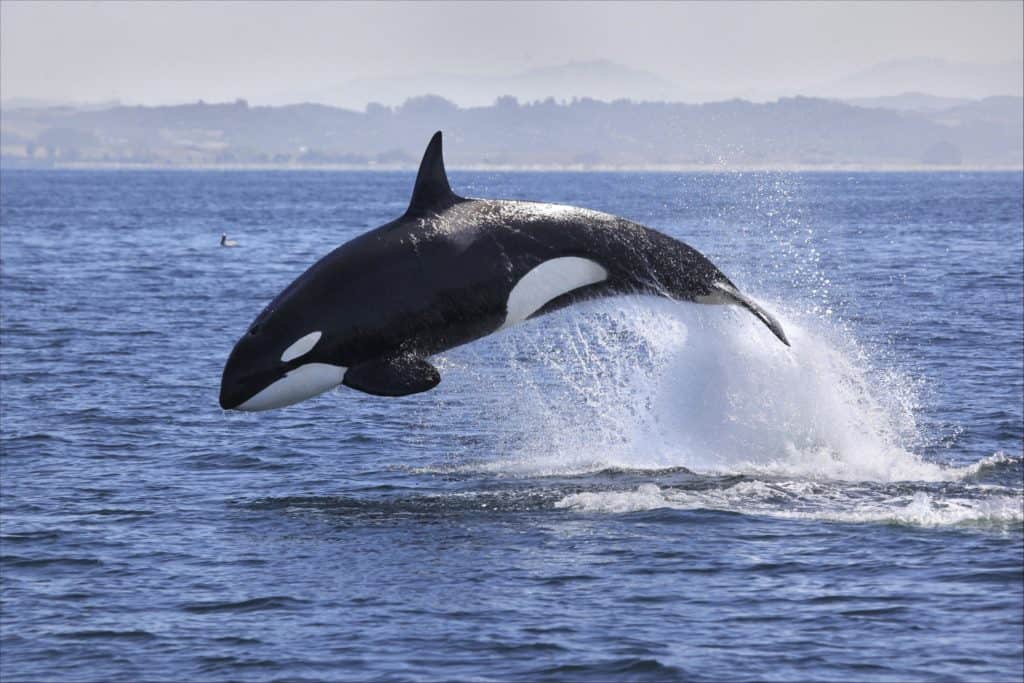
Yes, whales poop. Anything that eats food must eliminate waste. The poop of whales is said to smell like fish, dog feces, and sulfur mixed.
Whales like to unload their bowels into the water near the surface. That’s because the krill they eat exists in deeper waters. There’s also less pressure on their bowel near the surface as opposed to the depths, which makes it easier to expel waste out of the body.
Whale poop is fluffy, foamy, and runny with a scattering of undigestible hard objects in it like squid beaks. The poop floats to the surface until it falls apart and sinks. Some describe it as jello-like.
Do Whales Fart?
Yes, whales fart. Almost all mammals experience flatulence, and it’s possible to see huge gas bubbles come up from underneath a whale when it expels air through its anus. Every member of the order Cetacea farts.
Whales fart for the same reasons that humans do. Farts release gas created by the digestive process, and they alleviate pressure from the air that’s been trapped inside the body.
A whale’s anal sphincter isn’t very tight. So, while it can hold in feces, gas is eliminated as quickly as it’s created. Scientists report that whale farts smell about as gross as you’d expect.
There haven’t been many studies that focus on whale flatulence directly. Most scientific interest relates to whale excrement, so what exactly makes up a whale fart is still a mystery.
Importance of Whale Poop to the Oceans

The ocean’s ecology relies on whale excrement as it plays a huge part in the nitrogen cycle. Whales help process nutrients and disperse them near the surface of the water in their feces. This is important because it brings nutrients from deeper waters to the surface that otherwise couldn’t be used to support the extensive amount of animals living in the top few thousand feet of the ocean.
Iron and phosphorous are important minerals that are lacking in a lot of oceanic environments. Whale poop helps to provide and disperse iron, which causes a phytoplankton bloom. The amount of iron in whale poop is over 10 million times higher than what’s in normal seawater.
Phytoplankton on all levels of the ocean benefits from the fallout of whale poop. The existence of phytoplankton is another backbone to all ecosystems in the ocean as a wide array of creatures rely on them as their only food source.
The cascade effect raises the size of krill and fish populations in the parts of the ocean that the whale frequents. Whale feces supports more krill than they consume, and the more they consume, the more feces they make. It’s a positive cycle.
Do Whales Pee?
Yes, whales pee. Their pee is just as vital to oceanic ecosystems as their poop. That’s because whale urine is a good source of phosphorous and nitrogen in the same way as feces. These nutrients help foster marine plants and phytoplankton, which are the backbone of life in many parts of the ocean.
What is Ambergris?
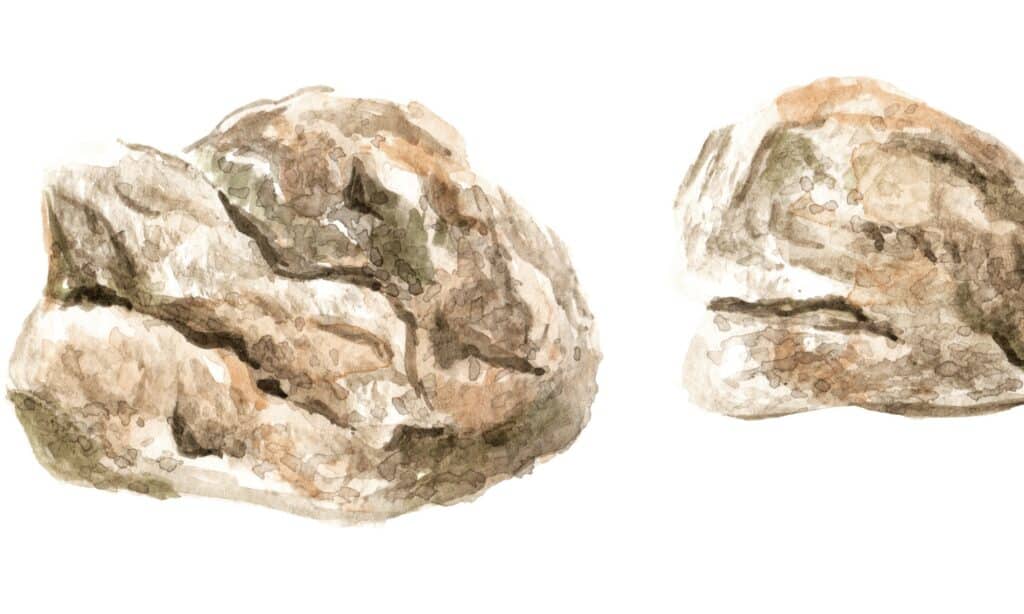
iStock.com/Daria Ustiugova
Ambergris is whale poop that’s floated in the ocean for years. While normal whale poop falls apart, this special form of excrement condenses into a substance that’s so hard it’s often mistaken for a rock.
The digestive system of sperm whales creates ambergris which is flammable and historically used in perfumes, cigarettes, and food. Sperm whales are the only known whales that produce ambergris. It originates in the intestines, and bile duct secretions are the source of this prized substance.
It’s usually found on coastlines or floating on the surface of the ocean. Sometimes there are hard things in it, like squid beaks. The common theory is that ambergris is produced to help pass those hard objects because hard things are frequently found in ambergris.
It remains somewhat of a mysterious substance because it’s only produced by 1% of all sperm whales, which makes it exceedingly rare and suggests that there isn’t a uniform reason for its production.
When it comes out of a sperm whale, it doesn’t appear the same as when people find it years later after it’s bobbed around in the ocean. At first, it’s soft and white, but things like oxidation harden it and darken it to gray or black.
Fossilized ambergris has been discovered, and ambergris can sell for a lot of money. A 280 lb piece was found in 2021 in Yemen. It is worth $1.5 million. Ambergris is illegal in some countries, including the United States.
More from A-Z Animals
.more-snake-card-image { max-height:140px !important; }
@media (min-width: 481px) {
.mobile-top-content {
display: none;
}
}
#mobileTopContentCTACarouselControls { overflow: hidden; text-overflow: ellipsis; white-space: nowrap; }
.mobile-top-content .more { color: #fff; }
.mobile-top-content a { color: #fff; text-decoration: underline; }
.mobile-top-content a:hover { color: #fff; text-decoration: underline; }
@media (max-width: 480px) {
.mobile-top-content {
background-color: #06a10b;
color: #fff;
text-align: center;
/*height: 60px;
padding-top:5px;*/
font-size:80%;
/* display: block; */
margin: 0px -30px;
}
}
Majestic is a word that comes to mind when we think of whales because of their immense size and grace in the water. They’re one of the last large mammals that roam the earth. Megafauna, like mammoths, were alive at the same time as whales.
Whales are in the order Cetacea, along with porpoises and dolphins. They are referred to as cetaceans. They’re important ocean dwellers for a variety of reasons, but their numbers have been decimated over the last couple of centuries.
Hunters killed 99% of the blue whales in the Southern Hemisphere, and other types of whales have similarly gruesome statistics. Since then, conservation efforts around the globe have helped to increase whale numbers dramatically.
The ocean is said to be the earth’s biggest toilet, which is a good thing for the life cycles of many animals. So, do these majestic whales poop in the ocean? We’re going to look at some details about whale excrement.
Do Whales Poop?

Yes, whales poop. Anything that eats food must eliminate waste. The poop of whales is said to smell like fish, dog feces, and sulfur mixed.
Whales like to unload their bowels into the water near the surface. That’s because the krill they eat exists in deeper waters. There’s also less pressure on their bowel near the surface as opposed to the depths, which makes it easier to expel waste out of the body.
Whale poop is fluffy, foamy, and runny with a scattering of undigestible hard objects in it like squid beaks. The poop floats to the surface until it falls apart and sinks. Some describe it as jello-like.
Do Whales Fart?
Yes, whales fart. Almost all mammals experience flatulence, and it’s possible to see huge gas bubbles come up from underneath a whale when it expels air through its anus. Every member of the order Cetacea farts.
Whales fart for the same reasons that humans do. Farts release gas created by the digestive process, and they alleviate pressure from the air that’s been trapped inside the body.
A whale’s anal sphincter isn’t very tight. So, while it can hold in feces, gas is eliminated as quickly as it’s created. Scientists report that whale farts smell about as gross as you’d expect.
There haven’t been many studies that focus on whale flatulence directly. Most scientific interest relates to whale excrement, so what exactly makes up a whale fart is still a mystery.
Importance of Whale Poop to the Oceans

The ocean’s ecology relies on whale excrement as it plays a huge part in the nitrogen cycle. Whales help process nutrients and disperse them near the surface of the water in their feces. This is important because it brings nutrients from deeper waters to the surface that otherwise couldn’t be used to support the extensive amount of animals living in the top few thousand feet of the ocean.
Iron and phosphorous are important minerals that are lacking in a lot of oceanic environments. Whale poop helps to provide and disperse iron, which causes a phytoplankton bloom. The amount of iron in whale poop is over 10 million times higher than what’s in normal seawater.
Phytoplankton on all levels of the ocean benefits from the fallout of whale poop. The existence of phytoplankton is another backbone to all ecosystems in the ocean as a wide array of creatures rely on them as their only food source.
The cascade effect raises the size of krill and fish populations in the parts of the ocean that the whale frequents. Whale feces supports more krill than they consume, and the more they consume, the more feces they make. It’s a positive cycle.
Do Whales Pee?
Yes, whales pee. Their pee is just as vital to oceanic ecosystems as their poop. That’s because whale urine is a good source of phosphorous and nitrogen in the same way as feces. These nutrients help foster marine plants and phytoplankton, which are the backbone of life in many parts of the ocean.
What is Ambergris?

iStock.com/Daria Ustiugova
Ambergris is whale poop that’s floated in the ocean for years. While normal whale poop falls apart, this special form of excrement condenses into a substance that’s so hard it’s often mistaken for a rock.
The digestive system of sperm whales creates ambergris which is flammable and historically used in perfumes, cigarettes, and food. Sperm whales are the only known whales that produce ambergris. It originates in the intestines, and bile duct secretions are the source of this prized substance.
It’s usually found on coastlines or floating on the surface of the ocean. Sometimes there are hard things in it, like squid beaks. The common theory is that ambergris is produced to help pass those hard objects because hard things are frequently found in ambergris.
It remains somewhat of a mysterious substance because it’s only produced by 1% of all sperm whales, which makes it exceedingly rare and suggests that there isn’t a uniform reason for its production.
When it comes out of a sperm whale, it doesn’t appear the same as when people find it years later after it’s bobbed around in the ocean. At first, it’s soft and white, but things like oxidation harden it and darken it to gray or black.
Fossilized ambergris has been discovered, and ambergris can sell for a lot of money. A 280 lb piece was found in 2021 in Yemen. It is worth $1.5 million. Ambergris is illegal in some countries, including the United States.





